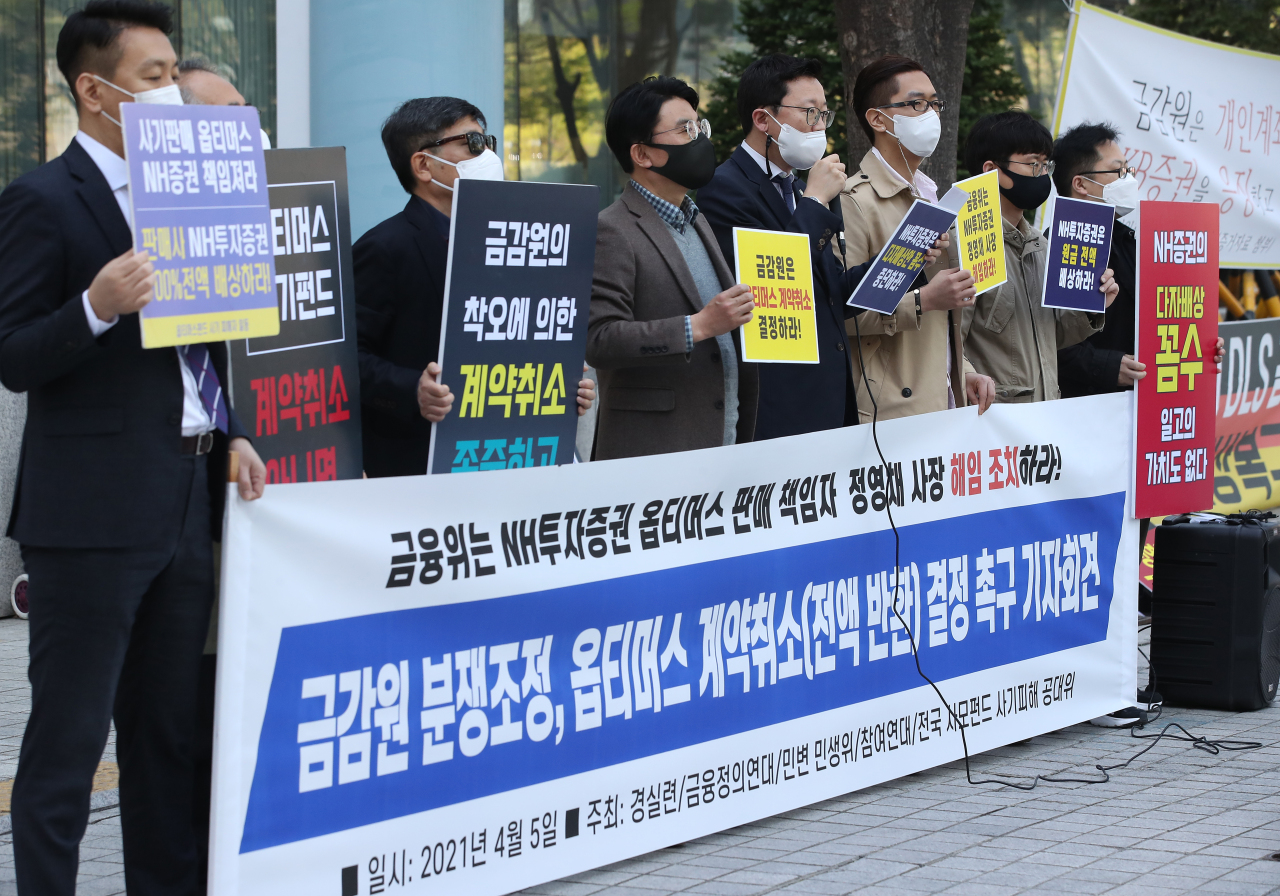South Korea’s financial watchdog said Tuesday that it holds NH Investment & Securities, the nation’s second-largest brokerage firm by net assets, entirely accountable for the misselling practices associated with the Optimus Asset Management alleged hedge fund fraud.
The Financial Supervisory Service ordered NH Investment to compensate end-investors for losses of some 300 billion won ($267 million) incurred in 326 cases they brought to the Financial Dispute Conciliation Committee, a special arbitrator under the umbrella of the FSS. Qualified professional investors were excluded.
The two contracts between NH Investment and end-investors of the funds were “made under a mistake” and are therefore “voidable,” said the FSS, citing the Civil Act. This means the financial consumers did not understand what they were signing.
“Optimus was practically unable to invest in trade receivables of companies dedicated to state-led construction projects when it signed fund sales contracts with NH Investment, but the fund seller relied on the hedge fund’s presentation and its own marketing process caused the fund investors to make a mistake,” the FSS said in a statement.
The arbitrator’s recommendation is applicable to the rest of the cases, it added.
Korean fund sellers have rarely been held accountable for misleading financial consumers. The Supreme Court ruled in 2016 that sellers of a private fund by Pine Asia Asset Management, then known as Phoenix Asset Management, were to blame for investors’ losses. It was the only case thus far where a court had recognized mistaken beliefs about investments as a viable reason to nullify contracts.
The Tuesday announcement is the latest development in the hedge fund scandal involving Optimus, which was managing some 500 billion won worth of assets as of last year when the fund was revealed to have duped fund sellers and end-investors in a scam.
Having disguised its hedge funds as funds investing in trade receivables -- generally considered a safe destination to park cash -- Optimus violated its contracts by using the pooled money to finance real estate development projects, acquire listed companies that were later delisted or suspended from trading, invest in privately held securities or extend loans.
Meanwhile, Optimus is accused of deliberately deceiving fund sellers through misappropriation and embezzlement.
NH Investment, the largest seller for Optimus, sold combined feeder funds worth a total of 697.4 billion won from June 2019 to May 2020. Among them, funds worth 432.7 billion won remain frozen since last June.
Of the total, 300 billion won was ordinary investors’ money, while the rest came from qualified professional investors.
Korea Investment & Securities, another fund seller, had privately compensated its customers for 90 percent of the 28.7 billion won they lost.
“We can hardly expect ordinary investors to take heed of the viability of (Optimus’ investment process),” the FSS also said.
The watchdog added that for qualified professional investors, court proceedings would be a more appropriate path.
The decision has apparently upset NH Investment, a brokerage arm of cooperative NongHyup Financial Group, as the company has stressed that the Optimus fund’s custodian Hana Bank and fund administrator the Korea Securities Depository should share the burden of compensating the investors.
The recommendation is not binding, and NH Investment could refuse to accept it. In that case, its customers would have to file a civil lawsuit.
The Optimus case is one of two high-profile hedge fund scandals that have evoked public distrust toward private fund investing. The other is Lime Asset Management’s 1.7 trillion won misselling fiasco.
In February, the arbitrator under the FSS ordered Lime fund sellers Woori Bank and Industrial Bank of Korea to compensate investors for at least half of the damages they incurred.
By Son Ji-hyoung (
consnow@heraldcorp.com)





![[Herald Interview] 'Trump will use tariffs as first line of defense for American manufacturing'](http://res.heraldm.com/phpwas/restmb_idxmake.php?idx=644&simg=/content/image/2024/11/26/20241126050017_0.jpg)

![[Herald Review] 'Gangnam B-Side' combines social realism with masterful suspense, performance](http://res.heraldm.com/phpwas/restmb_idxmake.php?idx=644&simg=/content/image/2024/11/25/20241125050072_0.jpg)
![[Health and care] Getting cancer young: Why cancer isn’t just an older person’s battle](http://res.heraldm.com/phpwas/restmb_idxmake.php?idx=644&simg=/content/image/2024/11/26/20241126050043_0.jpg)